
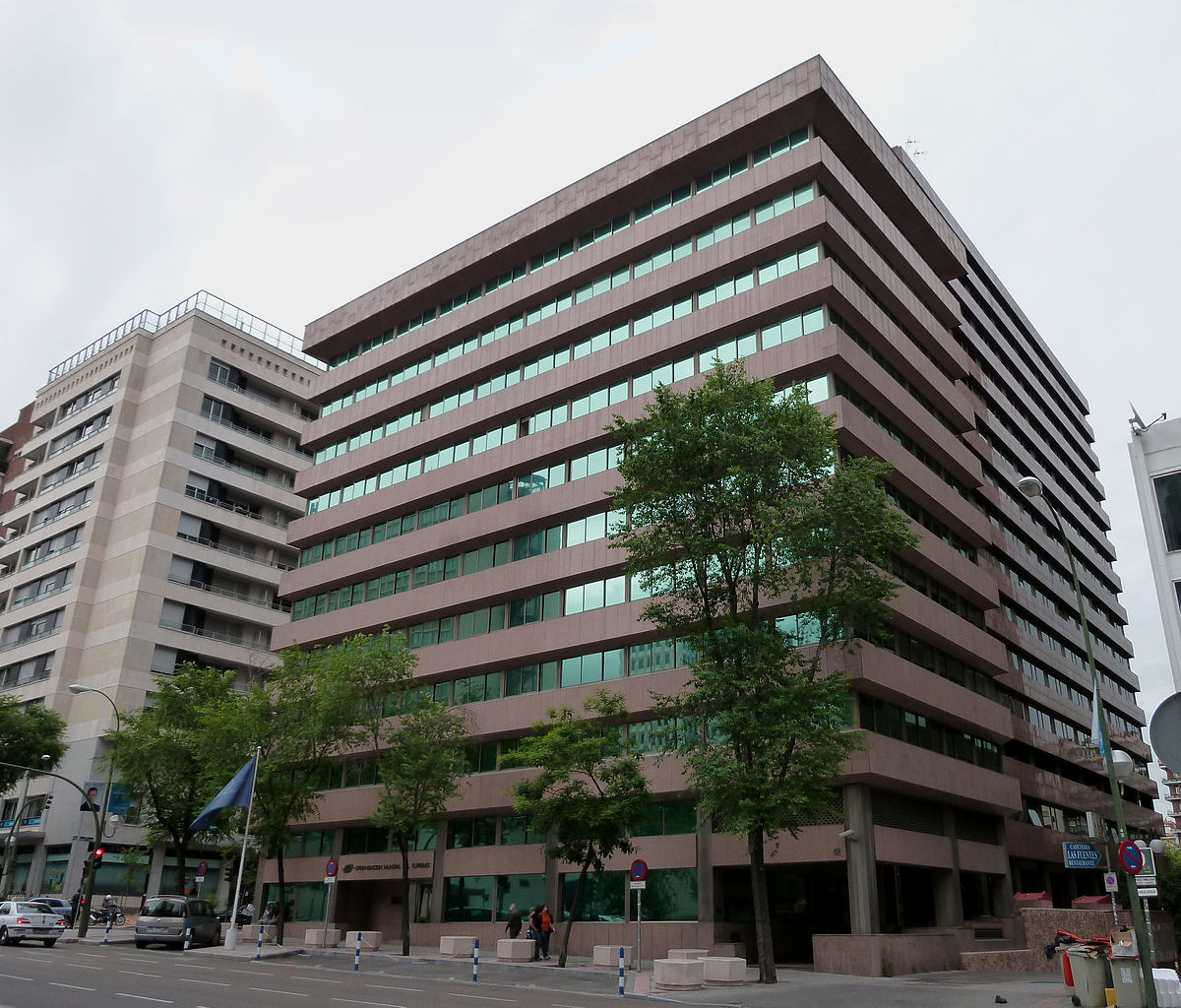
UNWTO announces the winners and finalists of the UNWTO Awards
The World Tourism Organization (UNWTO) announces the winners of the UNWTO Ulysses Prize and the UNWTO Ethics Award, as well as 14 finalists for the upcoming 14th Edition of the UNWTO Awards for Innovation in Tourism. The Awards Ceremony will be held next January 2018 in Madrid on the occasion of the International Tourism Fair, FITUR.
The UNWTO Awards recognize inspirational individuals and projects for their innovative achievement as well as their invaluable dedication to developing and advocating sustainable tourism in line with the UNWTO Global Code of Ethics for Tourism and the Sustainable Development Goals (SDGs).
The 14th Edition of the UNWTO Awards will take place in January 2018, co-hosted by FITUR, the International Tourism Fair in Spain/IFEMA in Madrid, Spain. The Awards Ceremony will be preceded by the UNWTO Awards Forum where finalists will present their respective projects.
The following are the awarded projects and individuals:
UNWTO Ulysses Prize for Excellence in the Creation and Dissemination of Knowledge in Tourism awarded to Valene L Smith.
Valene L. Smith, Professor Emeritus and Research Professor at the California State University, Chico, California, United States of America has been nominated as the 2018 UNWTO Ulysses prize laureate.
Professor Smith is a pioneer in tourism and anthropology, with an extensive number of projects and accomplishments throughout her extensive career. Her classic book, ‘Hosts and Guests’ (University of Pennsylvania Press, 1977), preceded by her 1953 geography courses, marked the start of this connection becoming explored by an army of scholars. She was recognized in 2000 as a Women of the 20th Century, and is a recipient of the US Chamber of Commerce’s Community Service Award. She is also an active member of various associations including the American Anthropological Association, the Society of Woman Geographers, the American Association of University Women and the American Fulbright Association.
UNWTO Ethics Award recognizes Europa Mundo Vacaciones
The Jury of the UNWTO Ethics Award, comprising Members of the World Committee on Tourism Ethics, has selected Europa Mundo Vacaciones as the winner of this second edition of the Award for its initiative “Europa Mundo Foundation”.
Europa Mundo Vacaciones is a Spanish tour operator strongly committed to the principles of environmental and social responsibility and has achieved remarkable results in the implementation of the UNWTO Global Code of Ethics for Tourism, particularly in its contribution to community well-being and sustainable development of tourism.
In 2011 it created a Foundation aimed at conducting social activities and development cooperation in different areas and for specific segments of the population, as well as to promoting sustainable tourism in many countries of Africa, Asia, Europe and Latin America.
The UNWTO Ethics Award was established in 2016 and is open to all companies and associations that are official signatories of the Private Sector Commitment to the UNWTO Global Code of Ethics for Tourism . To be eligible for the Ethics Award, signatories must have reported on its implementation.
14 Project finalists of the UNWTO Awards for Innovation in Tourism
Fourteen innovative projects among 128 applicants from 55 countries have been selected as finalists of the 14th UNWTO Awards for Innovation in Tourism. The winners will be unveiled during the UNWTO Awards Ceremony.
The list provided below is based on the alphabetical order of the country.
UNWTO Award for Innovation in Public Policy and Governance
- MiBarrio – Mercado de Hacienda Applied Research Project, Ente de Turismo del Ministerio de Modernización, Innovación y Tecnología del Ciudad Autónoma de Buenos Aires, Argentina
- Longmen Grottoes “Internet + Longmen” action plan, Management Committee of Longmen Grottoes World Cultural Heritage Park, China
- Tourism training talent (TTT), Turismo de Portugal, Portugal
UNWTO Award for Innovation in Enterprises
- Great Plains Conservation: Conserving and Expanding Natural Habitats, Great Plains Conservation and the Great Plains Conservation Foundation, Botswana and Kenya
- Conservation and Livelihoods: Community managed Ecotourism at Mangalajodi, Mangalajodi Ecotourism Trust, India
- Community and Resilience: two villages tackle depopulation, Valle dei Cavalieri, Italy
- Three-Pillar Innovation Initiative, Balesin Island Club, Philippines
UNWTO Award for Innovation in Non-Governmental Organizations
- Educating and empowering local communities for sustainable tourism futures, The Sumba Hospitality Foundation, Indonesia
- Connecting community, local friends, and visitors to a unique experience and happiness, Triponyu.com, Indonesia
- IT.A.CÀ – Migrants and Travelers, Festival of Responsible Tourism, Associazione YODA, Italy
- Strengthening Community Tourism in the Sierra Gorda, Grupo Ecologico Sierra Gorda, Mexico
UNWTO Award for Innovation in Research and Technology
- EarthCheck Building Planning and Design Standard (BPDS), EarthCheck, Australia
- eVisitor – Croatian national tourist information system, Croatian National Tourism Board, Croatia
- Smart Tourism System (STS), SEGITTUR, Spain
Further information:
- 14th UNWTO Awards Forum, 15 January 2018, Paraninfo, Complutense University of Madrid, Madrid, Spain.
- 14th UNWTO Awards Ceremony, 17 January 2018 at IFEMA, Madrid, Spain.
Useful links:
- 14th UNWTO Awards Events
- Sponsorship opportunities
- Register for the events: the registration will open early December.
- More information on the winners and finalists:
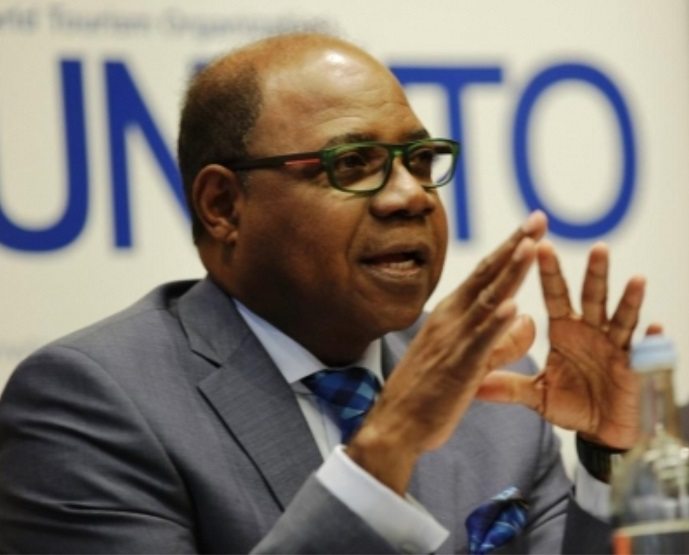
Jamaica is the center of global tourism: Hon. Edmund Bartlett in charge
World Tourism is in Jamaica this week. Two years of planning under the leadership of the Hon. Edmund Bartlett, Minister of Tourism, Jamaica, travel and tourism leaders from around the world are meeting at the Montego Bay Convention Center this week.
The Global Conference on Jobs and Inclusive Growth: Partnerships for Sustainable Tourism has many times the importance it had when the Jamaica minister started planning to bring this event to his country.
Today the Caribbean Tourism industry is in a crisis, and Hon. Edmund Bartlett had emerged as the number one leader in becoming a crisis leader for the good of the region.
The Monday program is as follows:
9:00– 9:10am Introduction of Keynote Speaker
Edmund Bartlett, Minister of Tourism, Jamaica
9:10 – 9:40am Keynote: The Future of Tourism – Innovation Challenges in the Caribbean Region
Eduardo Fayos-Solá, Senior Adviser, IITS George Washington University
9:40 – 10:15am Overview Session – The Future of Tourism
Moderator: Lloyd Waller, Senior Advisor to the Minister of Tourism, Ministry of Tourism, Jamaica
- Dionisio D’Aguliar, Minister of Tourism and Aviation for the Bahamas and Chairman, CTO
- Karolin Troubetzkoy, President, CHTA
- Kim Hurtault-Osborne, Executive Secretary for Integral Development, OAS
- Virginia Messina, Director, Caribbean Recovery Taskforce, WTTC
- Carlos Vogeler, Executive Director, UNWTO
- Abel Matutes, Director General, Palladium Hotel Group
10:30 – 12pm Concurrent Panel Sessions
Session 1: Tourism and Sustainability – Threats, Risks, Opportunities and Challenges
Moderator: David Jessop, Consultant, Caribbean Council
- Seleni Matus, Executive Director, International Institute of Tourism Studies, George Washington University – ‘Report on the Sustainability of Tourism Destinations in Caribbean’
- Jake Kheel, Vice President, Grupo Puntacana Foundation – ‘The Keys to Sustainable Tourism’
- Gaunette Sinclair-Maragh, Associate Professor, University of Technology – ‘Sustainable Development of Protected Areas for Ecotourism: A Case of the Portland Bight, Jamaica’
- Lisa Indar, Head, Regional Tourism and Health Programme, Caribbean Public Health Agency – ‘Improving Safer, Healthier and Sustainable Tourism through the Regional Tourism and Health Programme’
- Martha Honey, Executive Director, Center for Responsible Travel (CREST) – ‘Lessons Learned from 50 Years from Large Scale Cruise Tourism in the Caribbean’
Session 2: Current Trends in Indigenous Tourism
Moderator: Louis D’Amore, Founder and President, International Institute for Peace through Tourism
- Judy Karwacki, President, Small Planet Consulting
- Casey Vanden Heuvel, Chief Operating Officer, Aboriginal Tourism Association of Canada ATAC
- Susan Otuokon, Executive Director – ‘Indigenous Communities (Maroons) in the Blue and John Crow Mountains’
- Edward Wray, Owner, Rastafari Indigenous Village – ‘Inherent Complexities, Conflicts and Confusions in the Concept of indigenous Tourism; Case Study: ‘The Rastafari Village, Montego Bay’
- Clive Muir, Associate Professor, Rusche College of Business, Stephen F. Austin State University – ‘Anancy’s House: Developing a Folklore Centre to Enhance Rural Tourism’
- Jamie Sweeting, President, Planeterra Foundation
Session 3: Talent Development and Human Capital Trends
Moderator: Vincent Vanderpool-Wallace, Former Minister of Tourism for the Bahamas and Former Secretary General of the Caribbean Tourism Organization
- Elizabeth Mackay, MBA BSc., Lecturer, University of the West Indies, Centre for Hotel and Tourism Management, Bahamas; Shaun D. Ingraham, Chief Executive Officer, One Eleuthera Foundation – ‘One Eleuthera Foundation: From Shared Vision to Inclusive Development – Building Partnerships for Sustainable Tourism Development’
- Nigel Cooper, Chairman, College of Business & Management, Consulting Committee and Programme Director, School of Hospitality and Tourism Management, University of Technology – ‘Is the Caribbean Tourism Market Missing out on Pet Tourism?’
- Elecia Myers – ‘Theocentrism and pro-environmental values in the context of tourism in the Caribbean’
- Auliana Poon, Managing Director/ Director, Tourism Intelligence International/ Tourism Intelligence Academy – ‘Innovation and the Future of Caribbean Tourism’
Session 4: Community Tourism
Moderator: Andrew Spencer, Executive Director, Tourism Product Development Co. Ltd
- Olivene Burke, Lecturer, University of the West Indies Mona; Pauline Milwood, Assistant Professor, Penn State University; Tarik Weekes, Research Officer, Institute for Criminal Justice – ‘Sustainability Community Based Tourism: A Fit for Purpose’ Model for Rural and Urban Enterprises’
- Ian Boxil, Dean, Faculty of Social Sciences, University of the West Indies Mona; Deborah Fletcher, Research Associate, Centre for Tourism and Policy Research, University of the West Indies and Majorie Segree, Research Associate, Centre for Tourism and Policy Research, The University of the West Indies – ‘Towards a More Sustainable Tourism in the Historic Town of Falmouth, Jamaica’
- Beverly Stewart, Tourism Specialist, Jamaica Social Investment Fund – Jamaica’s JSIF/World Bank Community Tourism Journey – ‘The Jamaica Social Investment Fund’s Rural Economic Development Initiative (REDI)’
- Hugh Hough, President & Founder, Green Team Global Inc – ‘The Wide-Reaching Benefits from the Growth of Community Tourism’
- Christine Marrett, Senior Programme Officer, Office of the Pro-Vice-Chancellor Global Affairs, University of the West Indies – ‘Reflections on the development of The Treasure Beach Destination Management Organisation (DMO) Limited from a cluster development project’
12:00 – 1:30pm Lunch Break with a Keynote Speech: Outlook for Outbound Chinese Tourism in the Caribbean
Xu Jing, Regional Director for Asia and the Pacific, UNWTO
1:30 – 3:00pm Concurrent Panel Sessions
Session 5: Tourism Networks – Creating Linkages, Reducing Leakages
Moderator: Adam Stewart, CEO, Sandals Resort
- Cary Wallace, CEO, Tourism Enhancement Fund
- Anne Crick, Senior Lecturer, Mona School of Business & Management, University of the West Indies Mona; Janet Crick, M.A, Tour & Creative Experience Director, Jamaica Culinary Tours, Falmouth Jamaica – ‘Challenges & Opportunities in Gastronomy Tourism: Finding the Sweet Spot’
- Carolyn Riley, Head, Tourism Linkages Network. Ministry of Tourism and Jamaro Marville, Research Fellow, Centre for Leadership and Governance, University of the West Indies, Mona – ‘A Practical Guide to creating a Model for Health & Wellness, Gastronomy, Sports & Entertainment, Knowledge as well as Sports & Entertainment Tourism: The Jamaican Case Study’
- Lisa Neirotti, Associate Professor & Director, Sports Management Programs & MTA, George Washington University; Paulton Gordon, Director, Community Service and Development, University of Technology – ‘Strategies to Optimize Sports Tourism Opportunities for Sustainable Development in the Caribbean’
- Larisa McBean, Graduate Student, University of Birmingham – ‘Sports Tourism as a Vehicle to Sustainable Development: An investigation into the Opportunities and Challenges to the Development of Sports Tourism in Jamaica’
Session 6: Science, Technology, Innovation in Tourism
Moderator: Trevor Forrest, Senior Advisor to the Minister of Science, Energy and Technology
- Simone Harris, Senior Tourism Network Strategist, Tourism Linkages Network, Ministry of Tourism; Lloyd Laing – ‘Prototype for Smart Attractions in Jamaica: Devon House-One of Jamaica’s celebrated Historic Landmarks’
- Caroline Couret, Founder & Director, Creative Tourism Network – ‘The creative tourism as a lever for the territorial development’ (TBC)
- Pauline Milwood, Assistant Professor, Penn State University; Olivene Burke, Executive Director, Mona Social Services, University of the West Indies Mona; Tarik Weekes, Research Officer, Institute for Criminal Justice – ‘Social Innovation & Development of Urban Spaces: In Search of a Model for Sustainable Tourism’
- Ramona Bavassano, Founder, Jammadda Permacultural Ecovillage, International Consultant on Human Sustainable Development – ‘Jamadda Permacultural Park in Treasure Beach Jamaica’
- Shinique Walters, Gender Monitoring and Evaluation Specialist, USAID-CARCEP, ‘Energy conservation in the tourism industry and its impact on sustainable development’
Session 7: Caribbean Tourism within the Context of the Americas
Moderator: Hugh Riley, Secretary General and CEO, CTO
- Allan Fyall, Endowed Professor of Tourism Marketing, University of Central Florida; Roberta Atzori, Assistant Professor, Sustainable Hospitality Management, California State University- Monterey Bay – ‘Rising Sea Levels: Time for Proactive Action in Florida and the Caribbean’
- Chloe Helen Bent – Doctoral Researcher, University of Birmingham – ‘The Cultural Heritage Brand of Treasure Beach: How can we address the need for community consultation?’
- Apirada Chinprateep, Assistant Professor, Department of Development Economics, National Institute of Development Administration – ‘Value Creation of Tourism Sector: In the case of 10 ASEAN Economies, applies to Jamaica’
- Andrea Saayman, Professor, School of Economics, North-West University; Melville Saayman, Research Director, Tourism Research in Economic Environs and Society (TREES), North-West University – ‘Scuba Diving and Sustainable Tourism Developed in a less developed country’
3:00 – 3:30pm Coffee Break
3:30 – 6:00pm Special Session on Building Resilience: Supporting Caribbean Tourism to Prepare, Manage and Recover from Crises
Building resilience in the face of natural disasters is both a humanitarian and economic necessity, especially for regions like the Caribbean where tourism is a major source of income and fuels the islands’ economies and societies. Therefore, it is essential for the region to have a functioning crisis preparation, management and recovery process that involves both the public and private sector. This panel will explore potential strategies for the tourism sector in the Caribbean to recover after Hurricane Irma, as well as look toward a long-term plan for future preparation, management and recovery. Furthermore, the importance of the private sector and aid agencies in the recovery process will be discussed, in addition to innovative public-private partnerships (PPPs) essential to building resilience.
Introduction: Taleb Rifai, Secretary General, UNWTO
Moderator: Carlos Vogeler, Executive Director, UNWTO
- Edmund Bartlett, Minister of Tourism, Jamaica
- Sandra Carvao, Chief, Communications and Publications, UNWTO
- Hugh Riley, Secretary General and CEO, CTO
- Virginia Messina, Director, Caribbean Recovery Taskforce, WTTC
- Cardigan Connor, Parliamentary Secretary for Tourism, Anguilla
- Kim Hurtault-Osborne, Executive Secretary for Integral Development, OAS
- Adam Goldstein, Chairman, Florida-Caribbean Cruise Association (FCCA) (TBC)
- Frank Comito, CEO and Director General of the Caribbean Hotel and Tourism Association
- Abel Matutes, Director General, Palladium Hotel Group
Welcome Reception at Montego Bay Convention Centre

Partnerships for Sustainable Tourism
Tomorrow in Montego Bay, Jamaica the UNWTO Summit on Jobs and Inclusive Growth will start. Delegated are arriving today (Sunday) from around the world.
Partnerships for Sustainable Tourism, SUNx Co-founder, Professor Geoffrey Lipman is one of them and will present 3 innovative ways to help Caribbean Tourism respond to the climate led Hurricane disasters.
Lipman said “Planning must now assume repeat threats, with climate change an increasing factor and response preparations a must.” He added “We are entering an age where Impact-Travel ~ measured: green: 2050 proof ~ will be the new norm”
He identified the following innovative concepts from SUNx designed to support climate resilient travel and tourism systems that could be deployed in the Caribbean.
SUNx Exchange a Climate, Learning, Innovation and Resilience strategy system. It is based on a network of cloud connected, solar powered pre-fabricated Centres for local Community focus, managed by bright next generation climate change champions. Shipped in a single container, they can be set up rapidly, without extensive machinery. The proof of concept SUNx Centre is being established in Belgium’s National Park in Q4 2017. A Caribbean Centre could be established in early 2018; and would play an important and strengthening role in advancing climate resilient Impact-Travel in the region. We plan a roll-out of SUNx Centres across UN regions in 2018/19 and Belt and Road states after that. The ultimate target is for at least one SUNx Centre in every country by 2030, geared to the SDG and Paris Accord programs.
SME Fast Funding The first challenge is to rebuild the tourism economy. SME’s employ a vast number of the labour population, and are diverse, spanning many different industries, geographies and financials profiles. They are vital for economic recovery, yet frequently face regulatory or business barriers to funding. Our partner 1st Global Capital has a strong track record in developing innovative products and electronic support systems, to get funds quickly into the hands of merchants, working in close collaboration with Caribbean Governments and Insurance Companies.
Resilience Education – 105 graduate trainees will be enrolled in our Impact-Travel Lifetime Learning System, designed to provide graduate training in climate change response. 5 will receive $3000 Maurice Strong Legacy Scholarships.
The Strong Universal Network SUNx, is a program of the EU based, not for profit Green Growth and Travelism Institute, and a legacy to the late Maurice Strong – sustainable development pioneer. Its goal is to promote Climate Resilient, Impact-Travel with good & bad effects measured and managed coherently: with Green Growth at the core and, 2050-proof in line with the Paris Accords and the W.E.F. 4th Industrial Revolution.
1st Global Capital (1GC) was established in 2014 to respond to this need and fill a void in the market. In 3 years we have grown from a $15 million per annum financier, to one of the larger funders in the industry, currently pacing to finance more than $200 million in 2017.
Geoffrey Lipman is also president of the International Coalition of Tourism Partners (ICTP) Membership is complimentary. ICTP Chairman Juergen Steinmetz is attending the Summit in Jamaica.

ETC and UNWTO discuss transnational themes and routes in Galicia
The European Travel Commission (ETC) and the World Tourism Organization (UNWTO) held an international seminar in Santiago de Compostela to exchange best practices on how to develop and effectively manage transnational tourism themes and routes. The ETC-UNWTO International Seminar on Marketing Transnational Tourism Themes and Routes was hosted by the Xunta de Galicia and Turespaña on 16-17 November 2017 in the emblematic city of Santiago de Compostela, final destination of the thousand-year-old pilgrim route the Way of St. James.
The two-day event provided insights into the development, management and promotion of transnational tourism themes and routes in Europe and worldwide, as well as practical guidance for National Tourism Organization (NTOs), Destination Management Organizations (DMOs) and National Tourism Administrations (NTAs) on how to market and promote destinations through transnational thematic tourism experiences and products.
“Destinations are at their best when they can benefit from shared experiences and best-practice examples” said UNWTO Executive Director Zhu Shanzhong. In this regard, “collaboration and cooperation among all stakeholders involved are vital to ensure the success of transnational initiatives”, he added.
The international seminar drew the participation of European NTOs, DMOs and travel trade entities, as well as representatives from the European Commission (EC), the European Parliament (EP), the United Nations Educational, Scientific and Cultural Organization (UNESCO), the European Tourism Association (ETOA) and the European Institute of Cultural Routes (EICR), among others.
The event was the occasion to launch the new ETC-UNWTO Handbook on Transnational Tourism Themes and Routes, which provides step-by-step guidance on how to achieve successful themed transnational tourism.
“ETC and UNWTO acknowledge the importance of transnational collaboration in tourism as the competition is becoming increasingly regional rather than national. Today, with the launch of the Handbook on Marketing Transnational Tourism Themes and Routes, we seek to support the work of tourism authorities, managers and experts in this direction” said ETC President Peter de Wilde.
“Europe is much more than its main iconic spots and therefore we should develop transnational policies that help us attract visitors to other destinations”, argued Nava Castro, Director of Tourism of Galicia. Castro referred to the Camino de Santiago and its recognition as the First European Cultural Itinerary and its cultural and spiritual dimensions worldwide. As highlighted, the Camino has become an international reference as it has welcome over 300,000 pilgrims on foot, by bicycle or on horseback of up to 179 different nationalities only in 2017. Only 3,000 visitors were doing the Camino three decades ago.
At the closing of the seminar, the President of Galicia Alberto Nuñez Feijóo reiterated the commitment of Galicia to a responsible, sustainable and accessible tourism, in the framework of the International Year of Sustainable Tourism for Development.

Buenos Aires accounts for over half of Argentina´s tourism
Buenos Aires generates over a half of Argentina´s Travel & Tourism GDP, revealed a new report by the World Travel & Tourism Council (WTTC), Latin America City Travel & Tourism Impact.
Latin America City Travel & Tourism Impact is one of a series of reports by WTTC which looks at the contribution of Travel & Tourism to city economies and job creation. The study covers 65 cities, six of which are in Latin America.
The city’s Travel & Tourism sector accounts for 5.1% of its overall economy and totals US$11.1bn. The sector employs 265,000 people in Buenos Aires, or 3.8% of the city´s workforce. Over a half of Argentina’s tourism GDP (59.1%) is in Buenos Aires, and the city is responsible for 46.3% of jobs in the sector in Argentina.
Buenos Aires has a high reliance on domestic tourism, even though the weak Argentinian peso has made the destination more affordable for foreign visitors in recent years. Overall domestic visitors account for 61% of Buenos Aires’ Travel & Tourism. Over the past decade, the number of overnight visits has more than doubled although this has mainly been driven by the domestic market as improved affordability has not yet been sufficient to attract large volumes of additional international visitors.
Slow international growth can partly be explained by the fact that Brazil, which is Buenos Aires’s top international market, has been suffering a recession in recent years.
International spend is responsible for 14.6% of Buenos Aires’ Travel & Tourism sector. The Argentinian government’s introduction last January of a scheme to allow international visitors to receive a refund of VAT on accommodation, should help to increase international spend in the future.
The total contribution of Argentina´s Travel & Tourism to GDP was ARS775.3bn (US$52.5bn), 9.6% of GDP in 2016. The total contribution of Travel & Tourism to employment, including jobs indirectly supported by the industry was 8.8% (1.58 million jobs). Over the next ten years, 400,000 new jobs will be generated through Travel & Tourism in Argentina. Buenos Aires will host WTTC´s annual Global Summit 18-19 April 2018. The Summit brings together over 900 delegates to discuss the opportunities, challenges and issues facing the industry, while its Tourism for Tomorrow Awards recognise the industry’s power to be a positive force in sustainability.
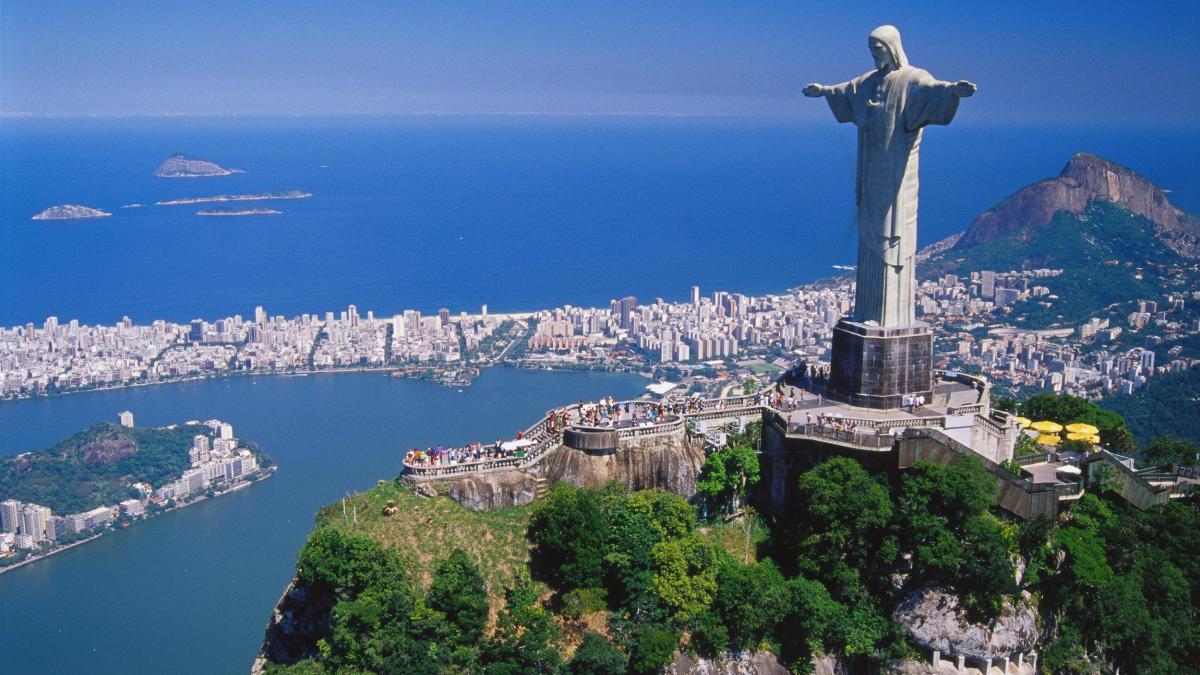
Rio generates over 10% of Brazil’s Travel & Tourism sector, but needs to work harder to attract international visitors
Travel & Tourism contributed US$6.5bn to GDP in Rio de Janeiro in 2016, 4.9% of the city’s economy, and representing 11.5% of Brazil’s Travel & Tourism sector. However, less than 6% of tourism spend in the city comes from the international market, revealed a new report by the World Travel & Tourism Council (WTTC).
Latin America City Travel & Tourism Impact is one of a series of reports by WTTC which looks at the contribution of Travel & Tourism to city economies and job creation. The study covers 65 cities, six of which are in Latin America.
The data suggests that hosting the World Cup in 2014 and the Olympics in 2016 had limited direct impact on overall Travel & Tourism GDP and employment in the city. In 2014, there was a small increase in the volume of visits and overnight nights stays however this level has not been maintained; and in 2016, as often seen after mega-events, there was a significant displacement to other destinations, with other travel postponed or deferred. Improvements in international demand were also offset by lower domestic demand due to the recession.
Less than 4% of Brasília´s Travel & Tourism activity was generated by international demand, as Brazil´s capital city relies on domestic spending. Business travel is important for the city, including large volumes of government related-travel. Growth has slowed more recently during the recession, but this follows some particularly strong growth in prior years as economic activity was booming, helped by increases in government spend.
Brasília´s tourism GDP is only 3.2% of the city´s economy, accounting for US$2.1bn. The sector generates 52,600 jobs in the city, or 3.9% of its employment.
The total contribution of Travel & Tourism to Brazil´s GDP was BRL530.5bn (US$152.2bn), 8.5% of GDP in 2016. The total contribution of the sector to employment, including jobs indirectly supported by the industry was 7.8% of total employment (7 million jobs). Over the next ten years, there will be 9 million jobs in Brazil through tourism activity.

The new Zimbabwe: What about tourism and Dr. Walter Mzembi?
Today it’s “Welcome to the new Zimbabwe”, ecstatic Zimbabweans keep saying this to me in the streets of Harare. “Now you journalists can come here and do your work without fear”. These are the tweets received by a journalist on the streets of Zimbabwe’s capital Harare.
Cheers “Free at last” are heard everywhere. Today a tense Harare has turned into a city of people dancing on the streets and celebration. Correcting the past is on everyone’s mind, but the next president expected to be appointed for this Southern African Nation may be one of the old guards. The British foreign minister and the British Prime Minister hope it will be a turning point to lead to a free and fair election in Zimbabwe.
Celebrations are not limited to Zimbabwe. People are on the streets in Johannesburg and London, many in exile hope to be able to go home.
This is tonight, but how will the future shape out for Zimbabwe?
Travel and tourism is a big currency earner and job creator in Zimbabwe, and earning currency, generating revenue and jobs should be on the top of the agenda in a country with more than 90% of the population unemployed.
One of the very successful leaders in the travel and tourism world under the Mugabe administration was Dr. Walter Mzembi. He single handed brought Zimbabwe back into the community of UNWTO nations, his lengthy service as chair of its Africa Commission and his hard-fought campaign to become UNWTO Secretary-General.
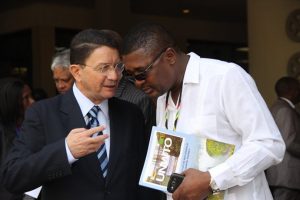
Mostly because of his efforts, Zimbabwe repaid all its unpaid Membership dues to UNWTO, re-joined the organization and a couple of years later was co-host of UNWTO’s Assembly in Victoria Falls, with Zambia, welcoming a thousand delegates from around the world. Mr. Mzembi fought one of the toughest fights when against all odds wanted to become the new Secretary General of the World Tourism Organization. Many insiders say he didn’t lose the battle because of his qualifications, his knowledge, and his intentions, but only because of the country, he represented.
The political world took over at the UNWTO General Assembly in Chengdu in September, when unexpected power and methods were used to convince the world to stand up against Zimbabwe, but these powers had no issue against Dr. Walter Mzembi as a person.
Importantly, Zimbabwe’s long-suffering tourism industry got a heart for a revival and as we all know unlocked investment and visitor revenue to boost its beleaguered economy and help lift its people out of poverty.
Mzembi for years went out of his way to promote his country’s tourism industry and build bridges for his country with a global mindset of peace and tourism, investment, friendship, and integrity. His diplomatic skills are exceptional.
In his short job as the foreign minister, he wasted no time assuring the world Zimbabwe is the place to invest.
Technically he is still the Foreign Minister recently appointed by Robert Mugabe and this may very well mean the end of his career or worse prison, when in fact his skills, standing, and connections should be better used to build a new Zimbabwe. Dr. Mzembi is currently in hiding – but for how long?
Dr. Mzembi had started to build a new Zimbabwe already and quietly. He started this process some time ago, always forced to move within the limitation his former boss gave him. How much more could he do without having these limitations now?
Dr. Mzembi was recently ousted from his party ZANU PF party along with numerous other cabinet members and President Mugabe himself.
Dr. Mzembi deserves the respect and the help of the global travel and tourism industry. He represented the future of Zimbabwe, he earned trust even among those that didn’t trust his country, and tourism had almost everything to do with it. It looks, however, he got hit in the crossfire.
This morning it’s a new Zimbabwe. The world needs to stand by Zimbabwe now. Zimbabwe needs leaders with a global vision. Dr. Walter Mzembi is one of these leaders.
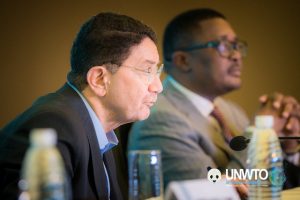

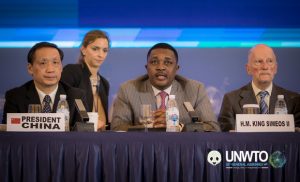
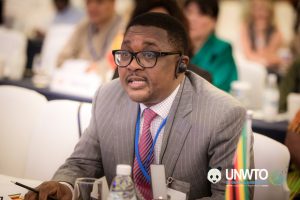

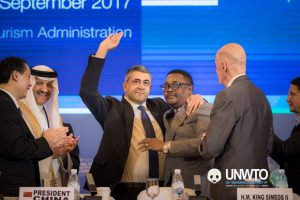
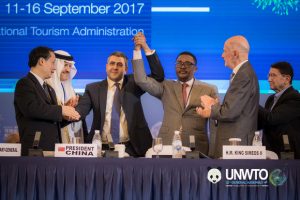
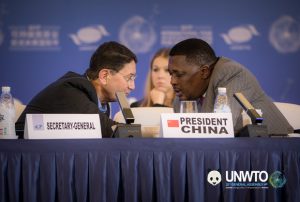
The global tourism world should show respect and appreciation, and stand behind one of their own, Dr. Walter Mzembi today.
Responding to the news that Robert Mugabe has resigned as President of Zimbabwe, Salil Shetty, Secretary General of Amnesty International said:
“After more than three decades of violent repression, the way forward for the country is to renounce the abuses of the past and transition into a new era where the rule of law is respected and those who are responsible for injustices are held to account.
“During 37 years of President Mugabe’s leadership, tens of thousands of people were tortured, forcibly disappeared or killed. President Mugabe condoned human rights violations, defended criminal actions of his officials and allowed a culture of impunity for grotesque crimes to thrive.
“Although Zimbabwe invested heavily in social services in the early years of independence, much of this progress was wiped out by later events such as the Operation Murambatsvina forced evictions campaign of 2005, which destroyed the homes or livelihoods of 700,000 people.
“The people of Zimbabwe deserve better. The next generation of leaders must commit itself to upholding the constitution, living up to Zimbabwe’s international human rights obligations and treating its people with dignity and justice.”
Perhaps Zimbabwe should use the voice they had today and say NO to Mugabe No to Zanu PF, No to organized coups, no to military rule and control. Yes to free and fair elections and Yes to a newly elected leader.
As one reader from Zimbabwe put it today: “How can we trust the same generals who kept Mugabe and ZANU PF in power for the past 37 years, to suddenly have a change of heart and care for our well being? People were carrying placards and posters portraying Mnangagwa and Chiwenga as our liberators. Was this not done to catapult themselves into the leadership of the country? Do we want Mnangagwa as our President, or we want elections to choose whom we want to lead us democratically?”
There are many questions and not so many answers, but today the people of Zimbabwe are happy, are motivated and see light at the end of a long tunnel.
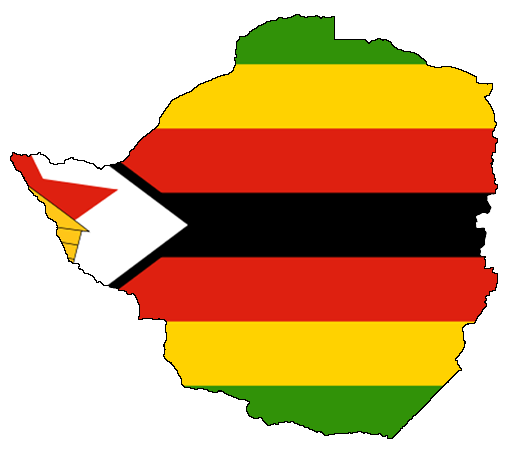
Dear Zimbabwe Military: It’s time for military diplomacy
Zimbabwe is facing a new reality after military intervention and the removal of their longtime president Robert Mugabe.
It’s time for military diplomacy to show the people friendly side of the Zimbabwe Military. This is a message echoed by senior travel and tourism leaders from around the world.
The International Institute for Peace Through Tourism (IIPT) Founder and President Louis D’Amore expressed concern and solidarity with Hon. Dr. Walter Mzembi and his family as he faces being a fugitive as a result of the military intervention in Zimbabwe.
Juergen Steinmetz, the Chairman of the Hawaii, Brussels, Seychelles and Bali based International Coalition of Tourism Partners (ICTP) with tourism board members in more than 70 countries said:
“Well-meaning Revolutions do not eat their children nor criminalize them, let alone their best. Mzembi is an excellent diplomat, an international citizen of repute, incarcerating him when he is Zimbabwe’s best option for dialogue and diplomacy out of this crisis kills common sense. He is still legitimately the chief diplomat of his country and sending him on the run ruins an opportunity for trade-offs and concessions and ultimately the attainment of sustainable peace and stability and legitimacy of what the Military is trying to sell to the world.”
Geoffrey Lipman, President of International Coalition of Tourism Partners (ICTP) and Chairman eTN Publisher Juergen T. Steinmetz
“Being a fugitive is not just physical but mental, it’s about civil liberties. Civilians do not need armored cars nor high-performance guns to engage them as was the case with the inordinate show of force with the capture of the Zimbabwe Minister of Finance Dr. Chombo.”
It’s time for military diplomacy to show the people friendly side of the Military.”
Yesterday ICTP President Professor Geoffrey Lipman said: “We are watching current events in Zimbabwe, independently and objectively, with no partisan interest.
However, we do know those strange things happen in uncertain times and we want to go on record for the well being of Walter Mzembi – until recently a very active Tourism Minister and latterly Foreign Minister of Zimbabwe.
We have known and admired Dr. Mzembi for years and have watched as he has traveled the globe representing his country with skill, dignity, and pride, most recently in an honorable quest for Secretary General of UNWTO.
We call on the global travel community to join us in our best wishes and support for our friend Walter and his family.”
The Peace Through Tourism chief Louis D’Amore added: “Dr. Mzembi has been a friend of IIPT since 2010 when we first met at World Travel Market and then collaborated during the IIPT Fifth African Conference in Lusaka regarding the successful joint proposal of Zambia and Zimbabwe to co-host the UNWTO 20th General Assembly at Victoria Falls Zambia and subsequently regarding the ‘IIPT Great Falls Peace Parks Initiative’ planned for 2018.”
Dr. Mzembi honorably represented Zimbabwe this past year as one of the leading candidates for the position of UNWTO Secretary-General with the endorsement of the African Union. He has also been a creative contributor to sustainable tourism strategies and development in Zimbabwe and all of Africa as United Nations World Tourism Organization (UNWTO) Regional Commission for Africa Chairperson; Chairman of the Southern Africa Development Community Committee of Tourism Ministers; UNWTO Executive Council Member UNWTO Co-President of the UNWTO 20th General Assembly; and a three-time President of the Africa Travel Association.
Hon. Dr. Mzembi is also the recipient of several prestigious awards including African Tourism Minister of the Year; African Tourism Investment Awards; Africa Leadership and Inspiration Award; Brand Leadership Award and others.
Dr. Mzembi will be a keynote speaker at the UNWTO – IIPT Global Summit: Sustainable Tourism for Development and Peace announced this past week at World Travel Market, being held in Montreal, August 27 – 30, 2018.
IIPT Founder D’Amore urges travel and tourism leaders throughout the world to join with UNWTO, ICTP and IIPT in support and solidarity with, Hon. Walter Mzembi and his family during this challenging time in Zimbabwe.
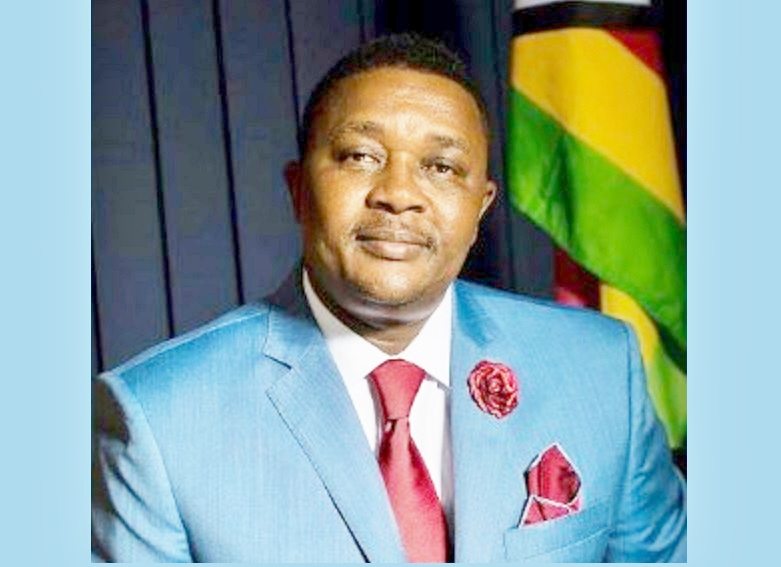
I am a fugitive, but I’m touched: Zimbabwe Foreign Minister Walter Mzembi speaks to eTN
Dr. Walter Mzembi, Foreign Minister of Zimbabwe is a fugitive. In response and within hours the Global Tourism Family is coming together today after a military intervention in Zimbabwe caused confusion, arrests, and uncertainty.
The current foreign minister for Zimbabwe had the post of the Tourism Ministry for many years.
From an undisclosed location Minister Mzembi told eTN publisher Juergen Steinmetz:
“I just got a surprise solidarity call from UNWTO Secretary-General Taleb Rifai and Hon Charles Banda of Zambia. I am touched by the expression of empathy and sympathy for my well-being and that of my family under these difficult circumstances. It really got to the bottom of my heart that a country I carried the cross for most recently in the UNWTO elections could be seeking to create a fugitive out of me! I trust that wisdom will prevail in the name of diplomacy to amicably end this crisis to the satisfaction of all.”
In the meantime the International Coalition of Tourism Partners (ICTP) calls for support for the Hon. Dr Walter Mzembi, Foreign Minister of Zimbabwe.
ICTP is a non-political organization promoting Green Growth and Quality equals business.
eTN President Professor Geoffrey Lipman said: “We are watching current events in Zimbabwe, independently and objectively, with no partisan interest.
However, we do know those strange things happen in uncertain times and we want to go on record for the well being of Walter Mzembi – until recently a very active Tourism Minister and latterly Foreign Minister of Zimbabwe.
We have known and admired Dr. Mzembi for years and have watched as he has traveled the globe representing his country with skill, dignity, and pride, most recently in an honorable quest for Secretary General of UNWTO.
We call on the global travel community to join us in our best wishes and support for our friend Walter and his family.”
The founder and president of the International Institute for Peace Through Tourism, Mr. Louis D’Amore also related his concern and wishes for the Mzembi family.
Mzembi responded: “I am really touched.”
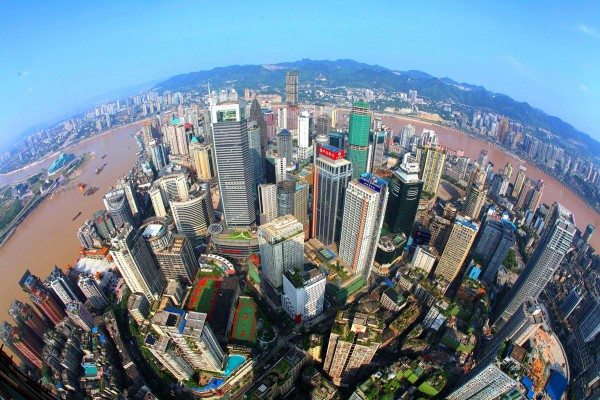
World Travel & Tourism Council: Top 10 fastest growing tourism cities are all in Asia
The World Travel & Tourism Council (WTTC) has launched the new city tourism impact data, which shows that the world’s top ten fastest growing tourism cities are all in Asia. Asia Pacific City Travel & Tourism Impact is one of a series of reports by WTTC, which looks at the contribution of Travel & Tourism to city economies and job creation. The study covers 65 cities, 21 of which are in Asia Pacific. The data shows that Asian cities are at the forefront of tourism growth over the next ten years.
Chongqing (14% growth per year) heads the table, followed by Guangzhou (13.1%), Shanghai (12.8%) and Beijing (12%). The other cities on the top ten list are Chengdu (11.2%), Manila (10.9%), Delhi (10.8%), Shenzhen (10.7%), Kuala Lumpur (10.1%) and Jakarta (10%). With the world average growth rate at 4% per year, and Asia Pacific at 5.8%, these cities are significantly outpacing both the regional and global average. Asia Pacific also includes some of the world’s largest Travel & Tourism cities. Shanghai, with an annual tourism GDP contribution of US$30 billion is the largest in the world; followed by Beijing (US$29 billion). Tokyo (US$20 billion) is ranked 6th in the world.
Shanghai and Beijing together account for 21% of China’s Travel & Tourism economic impact (GDP), whereas Tokyo alone accounts for 18% of Japan’s total. The dominance of the Chinese market is clear, both in terms of future growth and overall size and as a main source market for destinations in the wider Asia Pacific region. The success of Chinese cities is largely driven by domestic business (as high as 94.5% of spend in Chongqing is domestic), and the Chinese outbound market is key for neighboring cities such as Tokyo (24% of spend is Chinese, the largest market) and Bangkok (38%).
Gloria Guevara, President & CEO, WTTC said “The power of Asian cities when it comes to driving the Travel & Tourism sector is clear to see in this new data. However, not only do these cities contribute significantly to their country’s tourism sector, tourism is an important generator of economic growth and jobs within the cities themselves. With this level of forecast growth, the importance of investment in long term planning, infrastructure and sustainable public policies cannot be underestimated. It is vital that city authorities understand the economic impact of Travel & Tourism, GDP and employment contribution, and not just visitor arrivals, as they seek to develop new products and opportunities to increase traveler spend and sustainable growth.
WTTC has invested in this new research and data to support them in this ambition. Other highlights from the report include: Singapore’s Travel & Tourism has doubled in the past ten years, to a total of US$12.4 billion in 2016 and supporting 164,000 jobs. Tourism in Bangkok generates US$18.2 billion for the city each year, representing 10% of the city’s economy and 50% of Thailand’s Travel & Tourism. Delhi and Mumbai together generate over 1 million tourism jobs, 10% of India’s total tourism employment. Macau is the most tourism intensive city in Asia Pacific with 27% of its economy a direct result of tourism spend. Eight cities in the study contribute more than 25% of their country’s Travel & Tourism economy: Auckland, Bangkok, Ho Chi Minh City, Jakarta, Kuala Lumpur, Manila, Seoul and Sydney.
